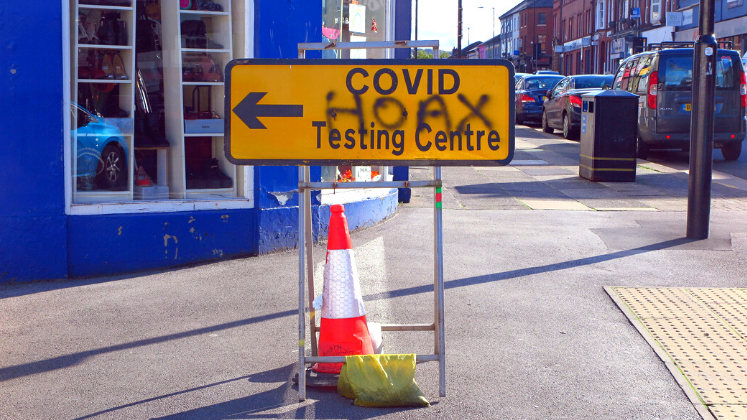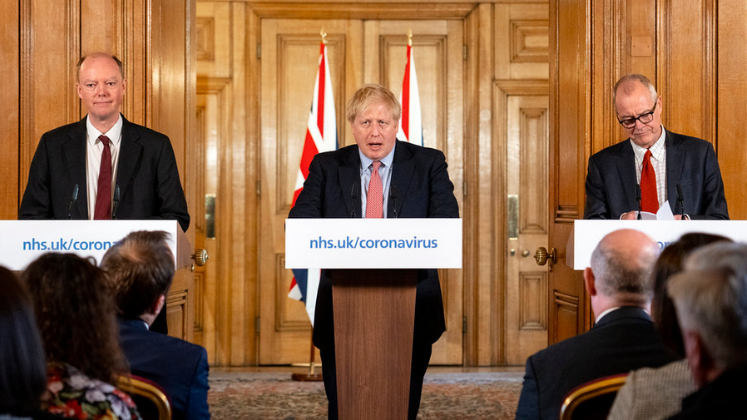Social media and a rolling news cycle have led to significant increase in and diversification of the types experts and expertise circulating in the public sphere. It has also introduced media dynamics into the production of knowledge. Drawing on the findings of new report, Christina Boswell and Molly Morgan Jones, suggest that the link between trust and relatability is important to good science communication.
One of the most striking trends in science communication over the past decade has been the shift in the profiles of science communicators, and the techniques they use. Whereas in the past we might have expected to be told about scientific insights by a bespectacled man in a lab coat on TV, today some of the most prominent science messengers are more ‘relatable’, and better reflect the diversity of the population. Many of them regularly use social media to post conversational updates that combine science content with details about their lives, hobbies and opinions. Among posts about research findings, they may share recipes, discuss parenting, or root for their favourite sports team.
This tendency appeared to be reinforced during the Covid pandemic, when several science communicators built up more ‘rounded’ or holistic online profiles by combining scientific content with insights into their daily lives. This undoubtedly helped build up familiarity and trust among their viewers, who may otherwise have been put off by more aloof profiles or abstruse messaging at a time of such uncertainty.
As part of new British Academy Report, Public Trust in Science for Policymaking, we explored, among other things, the implications of these changes in styles of science communication for public trust. The report drew on two commissioned reports and a literature review, offering broad insights into when and how members of the public build trust in the science that informs policy decisions. In this blog, we focus on the specific issue of the profiles of science communicators or messengers.
some of the most influential science communicators foregrounded aspects of their own lives to make technical mpox content more accessible
The report looked at examples of science communications with the public, including the phenomenon of science messengers taking to TikTok to talk about mpox. Researchers Professor Kathryn Oliver and Dr Warren Pearce found that some of the most influential science communicators foregrounded aspects of their own lives to make technical mpox content more accessible, as this helped them to build trust with their audiences. The research also looked at more anonymised or impersonal science communication and content and found examples of where this approach seemed less successful in building the public’s trust. In short, there is still work to do in empirically testing the relationships between content and trust in this emerging space of science communication.
It’s easy to understand why a relatable approach helps to build trust. Trust implies endowing others with the responsibility to act on our behalf, which builds a relationship of dependency under conditions of uncertainty. People rely on a variety of mechanisms to ground such trust; they may decide to trust a messenger because they have confidence in the rules in place that guide their behaviour. Or they may infer trustworthiness from the messenger’s good track record of communicating verified claims.
Trust implies endowing others with the responsibility to act on our behalf, which builds a relationship of dependency under conditions of uncertainty.
And yet, the public’s confidence can be fragile. The checks and standards guiding the scientific process are often opaque to members of the public. Confidence in science used to make government decisions can be particularly eroded where science becomes politicised – invoked by rival political protagonists in a selective way to reinforce their positions. Trust may also be difficult to build where science has not proved effective in preventing or mitigating problems in the past, making it challenging to build trust based on track records.
Where this occurs, members of the public may rely on other shortcuts for establishing trust, including the characteristics of the communicator. Attributes like authenticity, candour and humour, or being a parent, sports fan or from a recognisable social background, may serve as more reliable bases for grounding trust in claims. Members of the public can infer trustworthiness through ascribing messengers with particular types of motivation or competence, based on their perceived familiarity.

So, should we be encouraging researchers and research communicators to adopt more relatable and rounded profiles to shore up trust in their messages? Certainly, we need to encourage them to make sure their content is accessible and engaging, and there is still a long way to go to build these skills across our research communities. But there are a couple of reasons why we might want to be cautious about going down the route of relatability.
Firstly, and most obviously, relatability itself is no guide to whether the evidence being presented is trustworthy and brings no guarantee as to the quality of information being shared. Indeed, a messenger’s relatability can contribute to building support for inaccurate or misleading claims. This is not to say that trust grounded in confidence in scientific methods, or the qualifications of researchers is always vindicated. History is replete with scientific theories that have been superseded or debunked. But most of us would agree that scientific, evidence-based findings do have a privileged role in guiding complex or risky decision-making, as scientists and researchers have access to relevant skills, equipment and techniques that are not accessible to most of the public.
While science is inevitably entangled with norms and interests, the commitment to methodological rigour and peer review distinguishes the scientific process from that of other spheres
Secondly, where the importance of scientific processes in establishing trust is diluted, this may have a longer-term corrosive effect on trust in science more generally. Science is inherently about the production of knowledge, a process guided by distinct norms and practices for validating knowledge claims. While science is inevitably entangled with norms and interests, the commitment to methodological rigour and peer review distinguishes the scientific process from that of other spheres – such as public policy, the media, or business. This unique feature of science is a precious asset that we would be reckless to relinquish. And it is crucial to preserving the authority and trustworthiness of science long-term.
This raises the question of how best to balance the demands of accessibility and openness with the need to preserve the integrity of scientific evidence? The answer, we believe, is not to dilute or underplay the importance of scientific qualifications and rigorous method in building trust in science. We should not abandon our profiles as academics, researchers, and scientists. Rather, we should open up science to the public by sharing understanding of our methods and demystifying our practices to make knowledge more accessible. We need to work harder to bring the UK’s diverse communities into the world of science, rather than eschewing our scientific credentials in the interest of relatability.
This post draws on the British Academy’s report: Public trust in science-for-policymaking
The content generated on this blog is for information purposes only. This Article gives the views and opinions of the authors and does not reflect the views and opinions of the Impact of Social Science blog (the blog), nor of the London School of Economics and Political Science. Please review our comments policy if you have any concerns on posting a comment below.
Image Credit: igor kisselev on Shutterstock.







